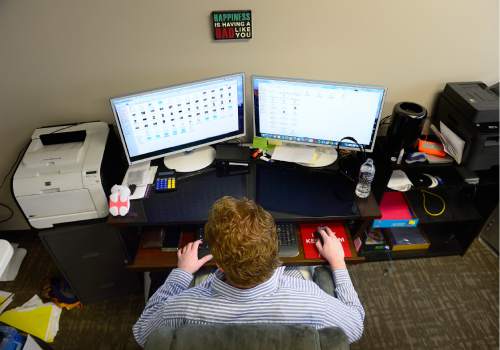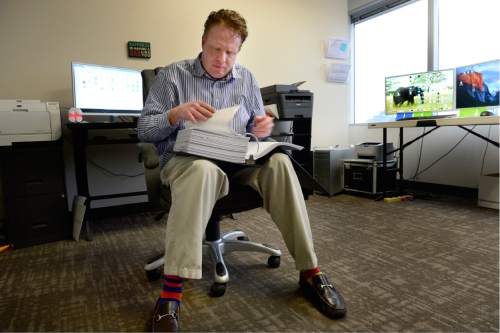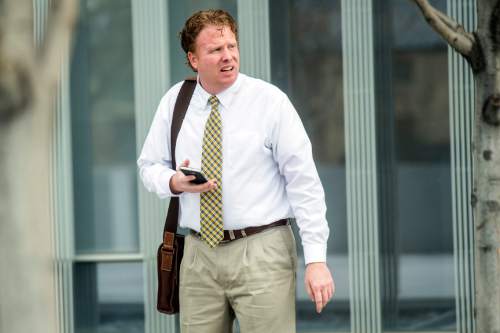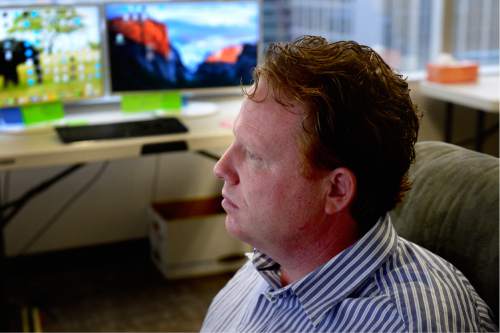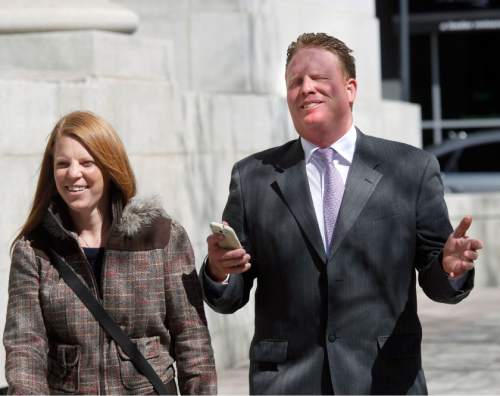This is an archived article that was published on sltrib.com in 2016, and information in the article may be outdated. It is provided only for personal research purposes and may not be reprinted.
St. George businessman Jeremy Johnson said Thursday he felt so intimidated by the judge in his federal court trial that he did not register objections or try to introduce evidence that contradicted testimony by government witnesses.
Johnson is acting as his own attorney in the trial before U.S. District Judge David Nuffer, where he and two co-defendants face 86 charges related to allegations of bank fraud connected to their operation of Johnson's online marketing company.
The judge's demeanor before the jury toward the defense came up on Wednesday when Johnson, defendant Ryan Riddle and attorney Marcus Mumford, who represents defendant Scott Leavitt, all expressed frustration with Nuffer.
On Thursday, the issue came up again with a discussion over an order Nuffer had filed and objections Johnson had made to pretrial orders that limit what evidence and theories the defendants can use in their defense. Johnson claimed that the government itself was violating the orders by going into areas it is also barred from introducing.
Nuffer told Johnson that he had to object every time to something he thought was improper and that Johnson was seeing some of the effects of his decision to act as his own attorney.
"I try to avoid you being upset and belittling me in front of the jury," Johnson said, pointing to what he said was similar treatment of Mumford by the judge.
Johnson has filed a motion to allow his standby counsel, attorney Greg Skordas, to begin helping him in questioning witnesses. Nuffer asked the government to respond before a ruling is made.
Government witnesses testified on Thursday that they did not sign documents used to open bank accounts in their names and, in fact, didn't even know they owned the companies used to apply for the accounts. But the defendants seemed to imply that critical documents were missing from the evidence.
The three witnesses gave key testimony to the government's case against the three defendants who are accused of creating shell companies and then using false information to open bank accounts so that Johnson's online marketing company could continue to charge consumers' credit cards. The new accounts were needed for the company to remain operating after I Works' own accounts were closed by banks because of a large number of credit card chargebacks, prosecutors say.
One of the government witnesses was Megan Spurling of Manti, who formerly was a manager at an I Works call center. She said she was asked to provide personal information that would allow I Works to form companies under her name and agreed.
"I wanted to help Jeremy out," said Spurling. "I felt obligated to, as part of my job."
When she was shown documents used to set up companies and open bank accounts, Spurling said the signatures were not hers. She also said she did not remember signing a power of attorney form that would have allowed someone else to sign on her behalf.
Mumford produced an email that showed a power of attorney form was among documents I Works wanted filled out when forming the new companies.
Spurling told Riddle that the documents she had received from employees, who also agreed to lend their names and personal information to I Works for the new companies, had been kept in her office. She said she believed it remained there when she was locked out after the Federal Trade Commission sued Johnson, I Works and others in December 2010.
Johnson and Mumford have alleged that thousands of critical emails and documents are missing from the evidence.


